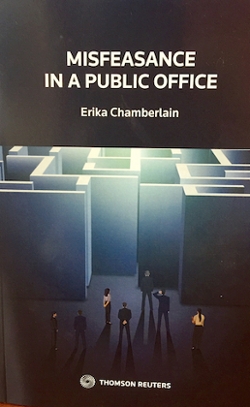Unique tort explored in new book
April 23, 2024
 The idea for Prof. Erika Chamberlain’s new book, Misfeasance in a Public Office, was sparked years earlier while Chamberlain was clerking at the Supreme Court of Canada.
The idea for Prof. Erika Chamberlain’s new book, Misfeasance in a Public Office, was sparked years earlier while Chamberlain was clerking at the Supreme Court of Canada.
During her clerkship, Chamberlain (pictured right) worked on the Supreme Court’s decision in Odhavji Estate v Woodhouse (2003), where a family sued police officers who failed to cooperate with an SIU investigation into their son’s shooting death at the hands of police.
The case gave the Supreme Court the opportunity to set out the elements of the modern tort of misfeasance in a public office, including the types of government activity and bad faith that can give rise to a claim.
“It was an extremely important case,” says Chamberlain. “Misfeasance is a unique tort with origins in the 1700s, but it needed to be updated to reflect the contemporary administrative state. Following Odhavji Estate, there was a resurgence in claims against public officers for abuse of power.”
 The topic intrigued Chamberlain enough to present a paper on it at a major conference on emerging issues in tort law hosted by Western Law in 2006.
The topic intrigued Chamberlain enough to present a paper on it at a major conference on emerging issues in tort law hosted by Western Law in 2006.
In 2009, she received a SSHRC grant allowing her to undertake further research for the book.
“There are not many people who write in this area, so the research involved a lot of original investigation,” she says. “I was able to apply more general tort theories to an underexplored area.”
Her book, published by Carswell, explains the history of this tort and assesses its theoretical justifications and framework. It also assesses dozens of contemporary cases from across the Commonwealth, providing a comprehensive reference on the tort’s primary elements and its interaction with other areas of tort law. It will be a valuable guide for those who work in the field of Crown liability.
Chamberlain’s book also addresses the future of the misfeasance tort in the modern democratic state. She explained, “The tort is not limited to the traditional conception of abuse of power, but includes a wide range of administrative decision-making by public officers. It serves a sort of ombudsman role.”
“This new book highlights Professor Chamberlain’s tremendous skill and eminence in this important area of the law,” says Dean Iain Scott. “ It’s a great accomplishment in an already impressive academic career.”
Chamberlain, Western Law’s Associate Dean (Academic) since 2012, is also the co-author of The Law of Torts in Canada, 3d ed. (2010) and Cases and Materials on the Law of Torts, 9th ed. (2015), and a co-editor of Emerging Issues in Tort Law (2007) and Tort Law: Challenging Orthodoxy (2013).
She is a founding member of Western’s Tort Law Research Group.





